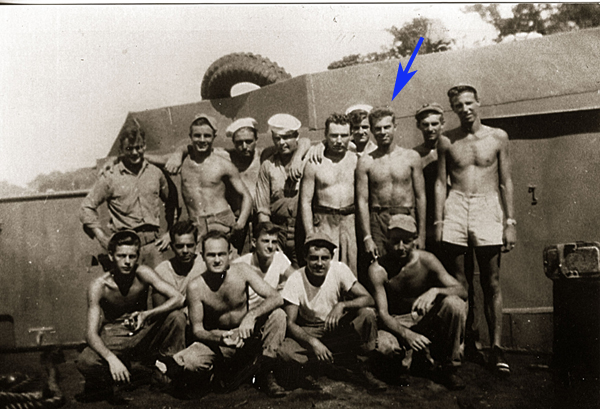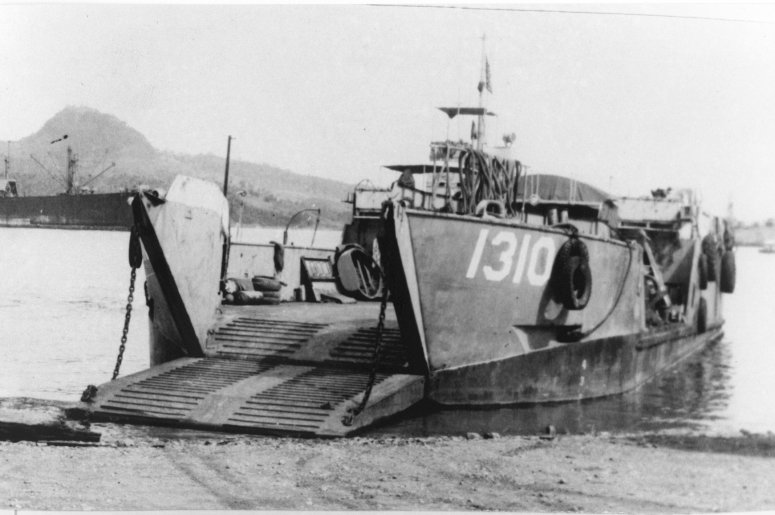For Pearl Harbor Day, Remembering My Dad in World War II
I admit it. I blew it, growing up. I never asked my dad to tell me his tales of World War II.
I started developing an interest in the war around age 10. I asked my dad what he’d done back then.
He was the skipper of a small boat in the South Pacific.
Okay, that sounds promising. My dad was captain of PT-109!
No, actually, it was an LCT (Landing Craft, Tank) used strictly to move cargo from island to island.
Oh. Well, did you see any combat?
A Japanese fighter flew over once, and it circled a couple of times, but decided we weren’t worth the effort to attack.
Okay, well, so ends the interest of a 10-year-old boy.
Meanwhile, my Sea Bee grandfather was telling me about diving under tractors while Zeroes strafed the airfield he was trying to build, and my uncle was an officer aboard a sub.
I didn’t talk to my dad about his experiences in any detail until late in his life, when I was in my 30’s. In fact, it wasn’t until the very last long conversation we ever had that I learned the whole story. It’s been 15 years since then. I should have written it all down at the time. I should have taped it. I should have videotaped it. But the last thing my mind was about to consider was, “I’m going to lose my dad soon, and this is my last chance to hear his stories.” So my memory is a little muddled. I remember the broad strokes, but not all of the details.
I’m setting it down now before it gets any more confused. Most of it is from my memory, some of it is based on other research:
Lyle L. Laws was in college when the war broke out. I’m not sure which college. It was probably one in Southern California. He joined the Naval ROTC, most likely after the war started. In 1944, he graduated and became an ensign in the U.S. Navy.

He was made skipper of the LCT-1321, at 119 feet long, one of the smallest boats in the Navy that had a permanent crew (in this case, 15 men.) The boat was transported across the Pacific from (probably) Vallejo (near San Francisco) to New Guinea. They fitted out and went into service in December of 1944.
According to my dad, a bookkeeping mistake was made, and delivered to the boat was a quantity of beer 10 times the ration normally given to an LCT. Sailors and soldiers in wartime are loath to give back anything extra they might be given. So my dad ordered the engineer to empty and scrub out one of the bilge oil tanks. They then poured all the beer into the tank for safe keeping.
They began ferrying troops and cargo from Hollandia (now Jayapura, in Indonesia) to Wadke Island, which the Allies had invaded back in May. The boat was never sent into a combat zone. It was always used to transport additional troops and materiel to an island after the fighting had long ago left the beach.

When docked in New Guinea, my dad met a lot of Australian naval officers. Australians get rum for their alcohol ration, not beer. And people always want what they haven’t got. So my dad was able to trade his extra beer for their rum. Then, when transporting American troops over to Wadke, he would take their American beer in trade for his Australian rum. Wadke Island is pretty small. The LCT’s were the only boats running supplies back and forth from New Guinea. Every luxury was scarce. My dad had plenty of customers ready to make a generous trade just to get a little bit of alcohol. In no time, he was the head of a small trading empire.
The boat itself was often given grim or dangerous tasks. Once, they transported hundreds of coffins – full coffins – from Wadke back to Hollandia. Often, they would transport fully-loaded tanker trucks or pallets full of artillery shells. So it’s just as well that that one Japanese plane decided they weren’t worth the effort.
Sometimes when the boat was being loaded or unloaded with several tons of explosives, my dad and his first officer would decide it was a good time to take the rowboat out for a quick cruise, say, 100 or so yards away from the LCT.
On one such occasion, as the boat was being loaded with ammunition in the middle of the night, my dad heard a series of loud CLANG’s and voices shouting. An artillery shell had come lose, bounced across the deck, and fallen into the water. After a few moments of silence, a giant plume of spray blasted the side of the boat as the shell hit bottom. Hundreds of fish now floated to the surface, killed by the blast. My dad had the crew collect them all and add them to the list of items for trade.
LCT-1321 moved up to Borneo, and finally up to Leyte in the Philippines. The boat had a reputation. When an Australian ship was sighted, it wouldn’t be long before my dad would see it change course and come towards them.
Through July and early August of 1945, my dad and his crew started to get nervous. Well, more nervous (it has an impact on your psyche, transporting hundreds of coffins, or enough explosives to vaporize the boat and everyone on it.) Up to this point, they only went to islands that had been cleared, or mostly cleared of the enemy.
Now they were assigned to the invasion of mainland Japan. This was different. Everyone knew how hard the Japanese had already been fighting – usually to the very last man. They knew that pilots were lining up for the privilege of flying their planes into U.S. ships. What would they do to defend their home islands? Even though his boat was “insignificant,” would people strap themselves with explosives and swim out to blow it up? There was no such thing as “safe” anymore.
Then in August came the unexpected news that some new type of bomb had been used, and it would end the war. My dad and his crew had no idea what it actually was. They just knew that the war was over. They were done.
The boat had a huge cache of extra food. Over the next few days the crew gorged on it, and on all the alcohol, in celebration. Other crews came by and shared in the feast. It was the end of the most terrifying, exhilarating, depressing, intense period of my dad’s life. And it had come suddenly, unexpectedly, which made the shock of it all the greater.
Within a couple of months, LCT-1321 had been decommissioned and placed in storage, most likely on Samar Island in the Philippines. She and hundreds of boats like her slowly rusted away, or were sold for scrap.
My dad returned home. He was discharged from the Navy but remained in the Naval Reserve for most of his life, eventually rising to the rank of Lieutenant Commander. He tried his hand as a radio announcer for a while, but then became interested in the mysterious new field of computer programming. He married and had two daughters with his first wife.
Well, that’s what I remember, or can piece together. If I had had more time with him, I would have asked so many more questions. And I could have started asking so much sooner. I couldn’t appreciate what he had to say, and what he’d been through, until I was an adult. I suppose most people have that problem with their parents.
He died in 1998. I still hear him in my head sometimes.